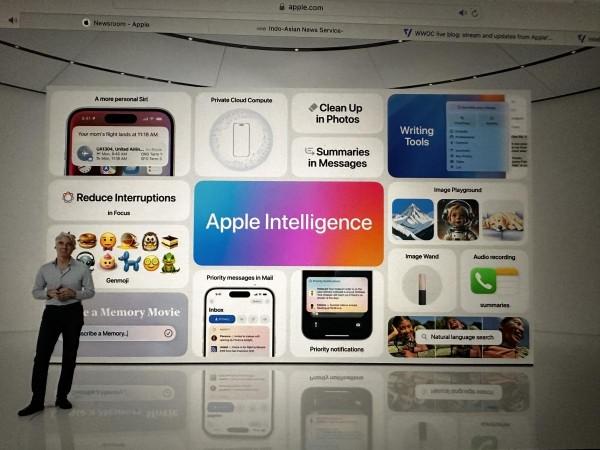
Apple is introducing 'Apple Intelligence', a new AI system, to its devices, aiming to revolutionize user experiences. The system leverages Private Cloud Compute, ensuring users' data remains secure while benefiting from AI. Key features include the integration of ChatGPT, systemwide Writing Tools, and the Image Playground API. Apple Intelligence also introduces Genmoji, a new way for users to express themselves, and provides Siri with enhanced action capabilities.
Apple, the tech giant known for its innovative technology and user-centric designs, has announced a significant leap forward in artificial intelligence (AI) technology. The company is set to introduce 'Apple Intelligence' to its devices, aiming to revolutionize user experiences across iPhone, iPad, and Mac systems. This new AI system will integrate powerful generative models into the core of these devices, marking a significant shift in the way people use devices to communicate, work, and express themselves. The new system will be part of iOS 18, iPadOS 18, and macOS Sequoia, set to be released in beta this fall.
Apple Intelligence is designed to understand personal context, delivering intelligence that is both helpful and relevant. This marks a significant shift in the way people use devices to communicate, work, and express themselves. The generative models have been infused with personal context to deliver intelligence that's incredibly useful and relevant.
Apple has always been a strong advocate for privacy, and with Apple Intelligence, the company claims to set a new standard for privacy in AI. The system leverages Private Cloud Compute, allowing it to flex and scale computational capacity between on-device processing and larger, server-based models that run on dedicated Apple silicon servers. This ensures that users' data remains secure while still benefiting from the power of AI.
One of the key features of Apple Intelligence is the integration of ChatGPT, which will also come to iOS 18, iPadOS 18, and macOS Sequoia later this year, powered by GPT-4o. This integration brings advanced AI capabilities to Apple devices, enhancing the user experience by enabling more sophisticated natural language processing. Siri and other AI features will be able to understand and respond to complex requests, provide more nuanced and contextually relevant assistance, and potentially generate text or content with greater creativity and accuracy.

Apple Intelligence also introduces systemwide Writing Tools built into iOS 18, iPadOS 18, and macOS Sequoia. These tools will help users rewrite, proofread, and summarize text across various applications, improving the quality and efficiency of written communication. The 'TextView' delegate API allows users to customize how their app behaves while the writing tool is active, for example, by pausing syncing to avoid conflicts while Apple Intelligence is processing text.
The Image Playground API is another innovative feature of Apple Intelligence. It allows users to quickly create delightful images using context from within their app. Since images are created entirely on the device, developers don't have to develop or host their own models for users to enjoy creating new images in their app.
Apple Intelligence also introduces Genmoji, a new way for users to express themselves. Genmoji are represented as inline images, unlike traditional emoji which are represented as text. Users can create an original Genmoji by simply typing a description, and their Genmoji appears, along with additional options. Users can even create Genmoji of friends and family based on their photos.
In addition to these features, Apple Intelligence provides Siri with enhanced action capabilities. Developers can take advantage of predefined and pre-trained App Intents across a range of domains to not only give Siri the ability to take actions in your app, but to make your app's actions more discoverable in places like Spotlight, the Shortcuts app, Control Center, and more.
Apple Intelligence also brings improvements to the Notes and Phone apps. Users can now record, transcribe, and summarize audio. When a recording is initiated while on a call, participants are automatically notified, and once the call ends, Apple Intelligence generates a summary to help recall key points. This feature is expected to be particularly useful in professional settings, where recalling key points from meetings or calls is crucial.
The introduction of Apple Intelligence marks a significant milestone in the evolution of AI technology. It follows a trend of tech companies integrating AI into their devices and services to enhance user experiences. For instance, Meta has been teaching AI models using public posts as a dataset in the US and other locations where Meta AI has been engaged. Google open-sourced its Android mobile operating system to better compete with Apple's iPhone, capturing a large chunk of the smartphone segment.
However, the integration of AI into devices and services has raised concerns about privacy and data security. Europe and the United Kingdom have rigorous privacy rules prioritizing consumer privacy. EU laws known as GDPR and the Digital Markets Act (DMA) make it difficult for large digital corporations like Meta to violate them. Apple's approach to AI emphasizes privacy by design, aligning with their established privacy-focused policies.
In conclusion, Apple Intelligence represents a significant step forward in the integration of AI into everyday devices. By combining advanced AI capabilities with a strong focus on privacy, Apple is set to revolutionize the way people use their devices. As we look forward to the release of iOS 18, iPadOS 18, and macOS Sequoia this fall, it is clear that the future of AI is here, and it is more personal, intelligent, and private than ever before.

















